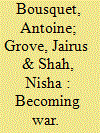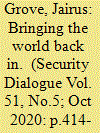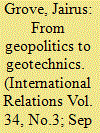|
|
|
Sort Order |
|
|
|
Items / Page
|
|
|
|
|
|
|
| Srl | Item |
| 1 |
ID:
175117


|
|
|
|
|
| Summary/Abstract |
Under the banner of martial empiricism, we advance a distinctive set of theoretical and methodological commitments for the study of war. Previous efforts to wrestle with this most recalcitrant of phenomena have sought to ground research upon primary definitions or foundational ontologies of war. By contrast, we propose to embrace war’s incessant becoming, making its creativity, mutability and polyvalence central to our enquiry. Leaving behind the interminable quest for its essence, we embrace war as mystery. We draw on a tradition of radical empiricism to devise a conceptual and contextual mode of enquiry that can follow the processes and operations of war wherever they lead us. Moving beyond the instrumental appropriations of strategic thought and the normative strictures typical of critical approaches, martial empiricism calls for an unbounded investigation into the emergent and generative character of war. Framing the accompanying special issue, we outline three domains around which to orient future research: mobilization, design and encounter. Martial empiricism is no idle exercise in philosophical speculation. It holds the promise of a research agenda apposite to the task of fully contending with the momentous possibilities and dangers of war in our time.
|
|
|
|
|
|
|
|
|
|
|
|
|
|
|
|
| 2 |
ID:
175128


|
|
|
|
|
| Summary/Abstract |
Quantum physics is being positioned as a new archive for addressing major theoretical problems in the field of international relations. Two of the major proponents of engaging quantum thinking within international relations, James Der Derian and Alexander Wendt, have argued that quantum thinking offers the possibility of a major paradigm shift in the field. Before we determine quantum’s revolutionary potential, the persistent and most pressing question for me is how to position quantum thinking among other kinds of and claims to knowledge. I want to horizontalize where different kinds of knowledge sit within the renewed attention to quantum theory. Rather than just horizontalize or flatten ontology, I want to see what happens when we place scientific and philosophical inquiry in dialogue, and what that conversation does to the authority and value of quantum thinking for the social sciences. The article reconstructs the dialogue between the first generation of quantum physicists and the philosophers who informed them. Rather than make an explicit argument about the philosophical debt of physics, I argue that a broad and highly interdisciplinary set of questions drove both fields well beyond the specific areas of expertise of any of these thinkers. I believe this adventure of ideas followed by physicists, philosophers, and social theorists alike offers us a way forward as the complexity of our contemporary global challenges confront us now with the necessity to think well beyond our disciplinary expertise.
|
|
|
|
|
|
|
|
|
|
|
|
|
|
|
|
| 3 |
ID:
175173


|
|
|
|
|
| Summary/Abstract |
This exploration provides an alternative future to that offered in the discussions surrounding what is often referred to by the ‘fourth industrial revolution’ or the ‘third offset’. I argue that even modest projections of existing trends have the capability of altering the grammar or ecology of geopolitics as well as the drivers for competition and catastrophe. Such changes are more significant than questions of how this or that actor might be different or which great powers may shape the international order in a hundred years. The essay seeks to understand what disruptive changes in non-human capability might mean for the shape of a potential geopolitics to come. In a more general sense, I want to think about how violence will be distributed differently. Will there be new sources and even kinds of competition unique to a global system populated and in some cases, structured by cunning machines – some mechanical, others digital – and what are the implications for how we imagine international relations?
|
|
|
|
|
|
|
|
|
|
|
|
|
|
|
|
| 4 |
ID:
150566


|
|
|
|
|
| Summary/Abstract |
IED attacks in Afghanistan went from 797 attacks in 2006 to 15,222 attacks in 2012. In that time, 53,997 IEDs and their human collaborators injured more than 11,416 US soldiers and killed over 1,298 soldiers in Afghanistan. If you include Iraq, IEDs account for almost two-thirds of all US soldiers wounded and killed in both wars. This article investigates why something as low-tech as an improvised bomb is so significant to contemporary warfare. The article contends that, contrary to the effort to “beat” the IED by the US Department of Defense, the IED is not a thing. The IED, I argue, is a condition of possibility present in almost all of contemporary life. IEDs are native inhabitants of a world of global relations and things that hover on the edge between tool and weapon.
|
|
|
|
|
|
|
|
|
|
|
|
|
|
|
|
|
|
|
|
|